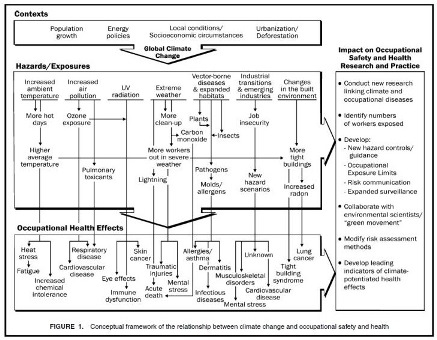
NIOSH Highlights Climate Change's Impact on Workers
The agency's Climate Change Occupational Safety and Health Work Group is working to determine OSH issues, identify gaps in worker protection, and make recommendations for safety and health improvements.
NIOSH on Dec. 1 described the work it is doing on the topic of climate change and why it considers climate change to be a risk for workers. Higher ambient temperatures, more extreme weather events, air pollution, and the possibility of increased prevalence and distribution of water-borne and foodborne pathogens could affect workers, according to the agency's discussion of the issue.
The NIOSH Climate Change Occupational Safety and Health Work Group has been established and is working to determine OSH issues, identify gaps in worker protection, and make recommendations for safety and health improvements. Other CCOSH Work Group activities are anticipated to include these:
- Maintaining an inventory of NIOSH activities relevant to climate change
- Developing a research agenda to address identified gaps and emerging issues
- Establishing and maintaining a reference database
- Identifying, developing, and disseminating communications products
- Participating on federal, state, and other climate change initiatives as appropriate to ensure OSH are included as core components of public health
 "In addition, NIOSH has made climate change and OSH an emphasis area and has funded an internal project that will use GIS data to identify workers and facilities that would be impacted by severe weather events," the agency stated. "OSH research in the area of climate change will also include projects to evaluate and characterize increasing hazards from direct effects of climate change such as severe weather events, heat, wildland fires, and infectious diseases. Other areas will address the OSH issues that result from changes in how we respond to climate change such as the development of renewable energy, carbon sequestration, and material substitution. The CCOSH Work Group will coordinate and collaborate with the CDC Climate and Health Program at the National Center for Environmental Health and the National Center for Emerging and Zoonotic Infectious Diseases as appropriate to foster open communication, maintain awareness of relevant CDC climate change activities, and ensure that OSH is included as necessary."
"In addition, NIOSH has made climate change and OSH an emphasis area and has funded an internal project that will use GIS data to identify workers and facilities that would be impacted by severe weather events," the agency stated. "OSH research in the area of climate change will also include projects to evaluate and characterize increasing hazards from direct effects of climate change such as severe weather events, heat, wildland fires, and infectious diseases. Other areas will address the OSH issues that result from changes in how we respond to climate change such as the development of renewable energy, carbon sequestration, and material substitution. The CCOSH Work Group will coordinate and collaborate with the CDC Climate and Health Program at the National Center for Environmental Health and the National Center for Emerging and Zoonotic Infectious Diseases as appropriate to foster open communication, maintain awareness of relevant CDC climate change activities, and ensure that OSH is included as necessary."
The article also discussed the fact that higher temperatures raise the need for climate-controlled buildings, which can pose indoor air quality problems. "Many industrial settings, such as paper mills, are not climate controlled and the higher temperatures resulting from climate change will increase heat exposure to these workers," it said.